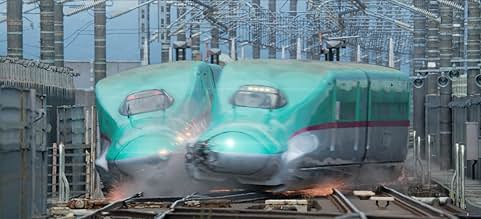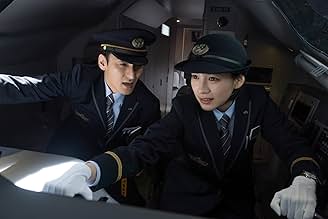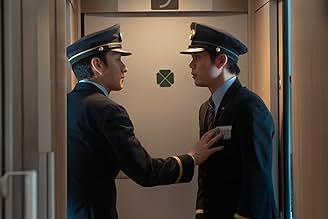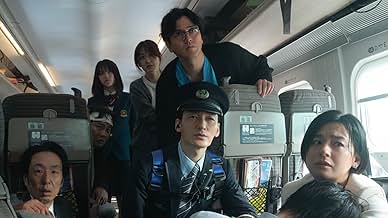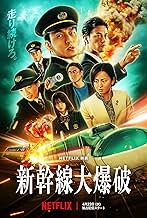Um grupo amarra bombas em um trem-bala japonês na tentativa de extorquir dinheiro do governo.Um grupo amarra bombas em um trem-bala japonês na tentativa de extorquir dinheiro do governo.Um grupo amarra bombas em um trem-bala japonês na tentativa de extorquir dinheiro do governo.
- Direção
- Roteiristas
- Artistas
Avaliações em destaque
But this is really good! I like the 3D-effects regarding to the bullet train and I green screen effects where they made it exceptionally clear. In perspective this not really realistic as it is in Japan, 'cause it's too much of actions. But in general I liked the actor's character more their personalities that fits into the movie. I was surprised about the character's performance regarding to bomber that planted the bomb on the train. That felt so good with the twist in the good way. However that is, I'm not gonna spoil it. So watch the movie and enjoy actions felt with sweat and tears. You'll not regret it!
An affectionate and well-realised update of Junya Sato's The Bullet Train, Bullet Train Explosion's devotion to delivering relentless edge-of-your-seat thrills ensures it's a blast from the moment it leaves the station. After his masterful reworking of Ultraman 3 years ago, I've been patiently waiting for Shinji Higuchi's next film. While the visual effects, direction, cinematography and camerawork are all top-notch, the carnage feels relatively restrained compared to Higuchi's prior work. However, even then, the film's greatest strength lies in its construction of tension and its commitment to showing how people respond to chaos. Some rise while others fall. Even with Higuchi as the film's conductor, this is still very much a one-track film, where Sato's original cross-cuts the action on board its Shinkansen with Ken Takakura's criminal antics, and here we are solely dedicated to the action on board. Despite its familiarity, there's also a fair dose of originality, although the late-game villain reveal had me howling with unintentional laughter. It's a long journey, full of near misses and assorted beats of suspense; although it abandons the complicating human factors that gave the original its soul, the film works very effectively as both a remake and a legacy sequel alike, even if the first half is far stronger than its latter half. Backed by strong performances and a rousing score by Taisei Iwasaki, Bullet Train Explosion is an effectively solid action disaster throwback, full of collectivism and collaboration.
With all due respect to my fellow critics-whose insights I genuinely admire-I must gently (but firmly) tap the brakes on this recurring assertion that Bullet Train Explosion is little more than a Japanese Speed. Yes, both films hinge on the same pulse-quickening premise: a vehicle that must maintain velocity or detonate spectacularly. But before we declare Speed the originator of this trope, let's give history its proper due-and a little reverence.
Because long before Keanu Reeves fired off "Pop quiz, BLEEP," and Sandra Bullock white-knuckled her way into action-movie legend, there was The Bullet Train (Shinkansen Daibakuha, 1975). A Japanese thriller that introduced the world to a high-speed train wired to explode if it dipped below a certain speed. Sound familiar? It should. This was the first film to plant a bomb squarely under the concept of velocity. And it was brilliant.
But the lineage doesn't stop there. Even Speed's screenwriter, Graham Yost, credited his inspiration not as some divine spark, but as a cinematic handoff from Runaway Train (1985)-another nail-biter about an unstoppable locomotive hurtling toward oblivion. Here's where it gets even juicier: Runaway Train was originally the brainchild of none other than Akira Kurosawa. Yes, that Kurosawa. The auteur behind Seven Samurai and Rashomon. He wrote the screenplay in the 1960s, envisioning a deeply human, existential thriller set aboard a runaway engine. Though he never got to direct it, his vision survived and roared to life years later under Andrei Konchalovsky.
So let's be clear: Bullet Train Explosion isn't some derivative knockoff trailing behind Speed. It's part of a long, cross-cultural cinematic tradition that spans continents and decades. It stands proudly in a lineage that includes Kurosawa, Konchalovsky, and yes, Jan de Bont. To reduce it to "Speed, but Japanese" is to miss the point-and miss the artistry.
As a Gen-Xer, Speed is sacred to me. It defined a decade of action cinema. It made "mass transit terrorism" an oddly specific genre. And it will always be brilliant. But brilliance doesn't need to be first. And homage is not theft-it's a love letter. Bullet Train Explosion is exactly that: a loud, stylish, blood-soaked valentine to its forebears.
So instead of side-eyeing the similarities, let's celebrate the shared DNA. Let's honor Bullet Train Explosion as a continuation-not a copy-of a global cinematic conversation about speed, stakes, and what happens when you can't stop moving.
With admiration for my fellow Speed disciples (I am one of you), and with cinematic history riding shotgun, I rest my case.
Because long before Keanu Reeves fired off "Pop quiz, BLEEP," and Sandra Bullock white-knuckled her way into action-movie legend, there was The Bullet Train (Shinkansen Daibakuha, 1975). A Japanese thriller that introduced the world to a high-speed train wired to explode if it dipped below a certain speed. Sound familiar? It should. This was the first film to plant a bomb squarely under the concept of velocity. And it was brilliant.
But the lineage doesn't stop there. Even Speed's screenwriter, Graham Yost, credited his inspiration not as some divine spark, but as a cinematic handoff from Runaway Train (1985)-another nail-biter about an unstoppable locomotive hurtling toward oblivion. Here's where it gets even juicier: Runaway Train was originally the brainchild of none other than Akira Kurosawa. Yes, that Kurosawa. The auteur behind Seven Samurai and Rashomon. He wrote the screenplay in the 1960s, envisioning a deeply human, existential thriller set aboard a runaway engine. Though he never got to direct it, his vision survived and roared to life years later under Andrei Konchalovsky.
So let's be clear: Bullet Train Explosion isn't some derivative knockoff trailing behind Speed. It's part of a long, cross-cultural cinematic tradition that spans continents and decades. It stands proudly in a lineage that includes Kurosawa, Konchalovsky, and yes, Jan de Bont. To reduce it to "Speed, but Japanese" is to miss the point-and miss the artistry.
As a Gen-Xer, Speed is sacred to me. It defined a decade of action cinema. It made "mass transit terrorism" an oddly specific genre. And it will always be brilliant. But brilliance doesn't need to be first. And homage is not theft-it's a love letter. Bullet Train Explosion is exactly that: a loud, stylish, blood-soaked valentine to its forebears.
So instead of side-eyeing the similarities, let's celebrate the shared DNA. Let's honor Bullet Train Explosion as a continuation-not a copy-of a global cinematic conversation about speed, stakes, and what happens when you can't stop moving.
With admiration for my fellow Speed disciples (I am one of you), and with cinematic history riding shotgun, I rest my case.
OK so it's over long (losing momentum a bit in the second half), and the villain when revealed is an eye roll that doesn't really make all that much sense. But despite that its a fun and at times tense action / disaster movie, the type of which doesn't get made all that much these days.
The cast are all good, and the sfx are generally good, although they would have benefitted from a slightly higher budget here and there. Some great cinematography too.
I think anyone who likes movies like Unstoppable, Silver Streak, Speed and other similar disaster movies will find much to enjoy in this film.
The cast are all good, and the sfx are generally good, although they would have benefitted from a slightly higher budget here and there. Some great cinematography too.
I think anyone who likes movies like Unstoppable, Silver Streak, Speed and other similar disaster movies will find much to enjoy in this film.
Bullet Train Explosion (2025) is an interesting ride that tries to bring back the disaster-thriller vibe but falls a little short on the human side of things. The directing by Shinji Higuchi feels like it cares more about showing the technical process of running a train than about telling a story through its characters. You can tell a lot of work went into the production itself, especially with the practical effects, model sets, and tight editing that really keep the tension high. The problem is, while everything looks good and feels intense, the characters end up feeling like background noise rather than the heart of the movie. It feels more like you are watching a really well-made simulation than being pulled into a story.
The acting is decent, especially from Tsuyoshi Kusanagi, who manages to bring some presence even without a lot of material to work with. The script, though, feels a bit thin, like it was written just enough to move from one tense scene to another without really digging into who these people are. The cinematography is clean and sharp, with some really impressive shots during the action sequences, and the sound design does a solid job of keeping you in that high-stakes atmosphere. The score is there but not very memorable, mostly serving the moment without standing out. Overall, it is a movie you can enjoy for the tension and visuals, but if you are hoping to get attached to the characters or dive deep into the story, it might leave you wanting more.
The acting is decent, especially from Tsuyoshi Kusanagi, who manages to bring some presence even without a lot of material to work with. The script, though, feels a bit thin, like it was written just enough to move from one tense scene to another without really digging into who these people are. The cinematography is clean and sharp, with some really impressive shots during the action sequences, and the sound design does a solid job of keeping you in that high-stakes atmosphere. The score is there but not very memorable, mostly serving the moment without standing out. Overall, it is a movie you can enjoy for the tension and visuals, but if you are hoping to get attached to the characters or dive deep into the story, it might leave you wanting more.
Você sabia?
- CuriosidadesThere is a character named Chiba. Sonny Chiba starred in the original Bullet Train in 1975.
- ConexõesRemake of O Trem Bala (1975)
Principais escolhas
Faça login para avaliar e ver a lista de recomendações personalizadas
Detalhes
- Data de lançamento
- País de origem
- Central de atendimento oficial
- Idioma
- Também conhecido como
- Pánico en el tren bala
- Locações de filme
- Empresas de produção
- Consulte mais créditos da empresa na IMDbPro
- Tempo de duração2 horas 14 minutos
- Cor
- Mixagem de som
- Proporção
- 2.35 : 1
Contribua para esta página
Sugerir uma alteração ou adicionar conteúdo ausente



